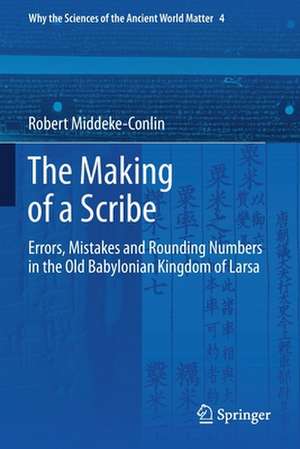The Making of a Scribe: Errors, Mistakes and Rounding Numbers in the Old Babylonian Kingdom of Larsa: Why the Sciences of the Ancient World Matter, cartea 4
Autor Robert Middeke-Conlinen Limba Engleză Paperback – 12 mar 2021
Through this work, the reader will gain insight into discrepancies encountered in economic texts in general and rounding numbers in particular. They will learn a new framework to explain error as a form of economic practice. Researchers and students will also become aware of the numerical and metrological basis for calculation in these writings and how the scribes themselves conceptualized value.
This work fills a void in Assyriological studies. It provides a methodology to explore, understand, and exploit statistical data.The anlaysis also fills a void in the history of mathematics by presenting historians of mathematics a method to study practical texts. In addition, the author shows the importance mathematics has as a tool for ancient practitioners to cope with complex economic processes. This serves as a useful case study for modern policy makers into the importance of education in any economy.
| Toate formatele și edițiile | Preț | Express |
|---|---|---|
| Paperback (1) | 791.25 lei 43-57 zile | |
| Springer International Publishing – 12 mar 2021 | 791.25 lei 43-57 zile | |
| Hardback (1) | 797.55 lei 43-57 zile | |
| Springer International Publishing – 12 mar 2020 | 797.55 lei 43-57 zile |
Preț: 791.25 lei
Preț vechi: 964.94 lei
-18% Nou
Puncte Express: 1187
Preț estimativ în valută:
151.40€ • 158.50$ • 125.28£
151.40€ • 158.50$ • 125.28£
Carte tipărită la comandă
Livrare economică 07-21 aprilie
Preluare comenzi: 021 569.72.76
Specificații
ISBN-13: 9783030359539
ISBN-10: 3030359530
Ilustrații: XXII, 487 p. 135 illus.
Dimensiuni: 155 x 235 mm
Greutate: 0.71 kg
Ediția:1st ed. 2020
Editura: Springer International Publishing
Colecția Springer
Seria Why the Sciences of the Ancient World Matter
Locul publicării:Cham, Switzerland
ISBN-10: 3030359530
Ilustrații: XXII, 487 p. 135 illus.
Dimensiuni: 155 x 235 mm
Greutate: 0.71 kg
Ediția:1st ed. 2020
Editura: Springer International Publishing
Colecția Springer
Seria Why the Sciences of the Ancient World Matter
Locul publicării:Cham, Switzerland
Cuprins
Chapter 1.Introduction.- Chapter 2. The early scribal education.- Chapter 3. Text types and archival practices in the kingdom of Larsa.- Chapter 4. Archives, bureaus and management systems of the kingdom of Larsa.- Chapter 5. Metrology and sexagesimal place value notation in economic texts.- Chapter 6. Errors, mistakes and evidence for a counting device.- Chapter 7. Observation and the limits of numeracy. Chapter 8. Multiplication and estimation.- Chapter 9. Rounding in mathematical and economic texts.- Chapter 10. Conclusion: On errors, rounding and education in the kingdom of Larsa.
Recenzii
“Middeke-Conlin's study greatly expands our understanding of the interplay between theoretical `school' mathematics and the actual practices of numerate scribes going about their daily business, at least in Old Babylonian Larsa. It is to be hoped that future scholars will take this careful and detailed methodology as a model for probing practices in other times and places.” (Duncan J. Melville, Mathematical Reviews, Issue (6), March, 2024)
Textul de pe ultima copertă
This book presents a novel methodology to study economic texts. The author investigates discrepancies in these writings by focusing on errors, mistakes, and rounding numbers. In particular, he looks at the acquisition, use, and development of practical mathematics in an ancient society: The Old Babylonian kingdom of Larsa (beginning of the second millennium BCE Southern Iraq). In so doing, coverage bridges a gap between the sciences and humanities.
Through this work, the reader will gain insight into discrepancies encountered in economic texts in general and rounding numbers in particular. They will learn a new framework to explain error as a form of economic practice. Researchers and students will also become aware of the numerical and metrological basis for calculation in these writings and how the scribes themselves conceptualized value.
This work fills a void in Assyriological studies. It provides a methodology to explore, understand, and exploit statistical data.The anlaysis also fills a void in the history of mathematics by presenting historians of mathematics a method to study practical texts. In addition, the author shows the importance mathematics has as a tool for ancient practitioners to cope with complex economic processes. This serves as a useful case study for modern policy makers into the importance of education in any economy.
Through this work, the reader will gain insight into discrepancies encountered in economic texts in general and rounding numbers in particular. They will learn a new framework to explain error as a form of economic practice. Researchers and students will also become aware of the numerical and metrological basis for calculation in these writings and how the scribes themselves conceptualized value.
This work fills a void in Assyriological studies. It provides a methodology to explore, understand, and exploit statistical data.The anlaysis also fills a void in the history of mathematics by presenting historians of mathematics a method to study practical texts. In addition, the author shows the importance mathematics has as a tool for ancient practitioners to cope with complex economic processes. This serves as a useful case study for modern policy makers into the importance of education in any economy.
Caracteristici
Introduces new methodological tools to explore economic texts for mathematical practice Shows the importance mathematics has as a tool for ancient practitioners to cope with complex economic processes Presents historians of mathematics a method to study practical texts





